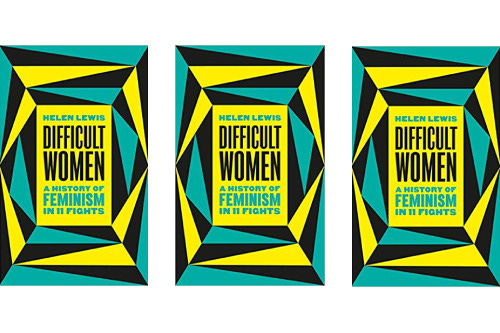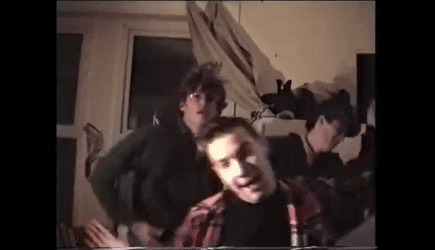Happy Friday!
This week I had a ramble chat with Adam Buxton (recorded in May) about . . . well, cargo cults, negativity bias, Jordan Peterson, Munchausen’s by internet and why I want to have some toilets named after me. We also talked about Difficult Women, and why he shouldn’t encourage his daughter to idolise Coco Chanel, even though it might help her survive a world war. Listen here.
Helen
PS. Sophie Wilkinson, who I interviewed in the Love chapter, has a newsletter. She writes a little about DW in the latest one.

Where Are The Young Male Novelists? (The Times)
“One publisher I speak to tells me that modern publishing is shaped by a preoccupation with identity politics. It’s “really, really hard” to publish literary fiction by young white men because “the culture doesn’t really want to hear from them”. That preoccupation pervades wider literary culture too: landing newspaper interviews with young white male novelists can be almost as impossible as finding them places on prize lists. There hasn’t been a young (if you count young as under 40) white British man on the Booker shortlist since 2011.”
What’s to blame for this, I think, is the well-meaning but fundamentally lazy mode of journalism which assumes that the most interesting things to say about a writer relate to their identity, or how that identity affects their work. See, for example, this description of one of the books on the Booker longlist, from the Guardian: “Other debuts include Real Life by US author Brandon Taylor, following a black, queer, introverted man from Alabama, which was described by judges as ‘a deeply painful, nuanced account of microaggressions, abuse, racism, homophobia, trauma, grief and alienation’.”
Right, but what’s the plot? What’s the literary tradition? How does it enlarge or subvert the form of the novel? What’s notable about its prose style, or its structure?
There’s a great strand of activism on Twitter which can be boiled down to “normalise asking black artists and writers about their craft, not their identity”. (Otherwise it’s “Steven Spielberg on the shots which make him a master storyteller” while we get “Ava DuVernay on being chronicler of black American life”.) Every female comedian in the world is bored with being asked “what’s it like to be a female comedian?” And yes, the fact that James Baldwin was both black and gay is central to his work, but it diminishes him not to talk, too, about what an incredible prose stylist he was, and what an acute observer of humanity and politics.
And then the flip side of all that is that publishers can’t get publicity for young white men . . . because they can’t speak “as a”.
PS. The other real insight in this piece is that maybe men have abandoned literary fiction because there’s no money in it (or even vice versa?) Maleness and prestige/seriousness are often interlinked. In the 1970s, literary fiction turned you into a Public Intellectual. Now, non-fiction is now the ticket to money and TED talks.
PPS. I discovered last night that the backlash to this was so intense that James has left Twitter, although hopefully only briefly.

I Visited Disney World During A Pandemic (Atlantic)
The guests have willingly submitted to the authority of the microstate of Disney World, and their submission is total, because they have judged Disney to be a trustworthy custodian of that authority.
Consider the anarchy of Florida, the state that surrounds it. Roughly one in 10 citizens has filed paperwork to carry a gun concealed on his person. The state song until recently still used the word darkies. The people are so ornery that they cannot be persuaded to wrap bandannas around their faces to save their own lives. Mosquitoes are large enough to engage in dogfights with hummingbirds. The state lizard is Roger Stone.
And then there is Disney World—a little bit of Singapore in the midst of America’s Yemen. Walt Disney is its Lee Kuan Yew. It is nothing if not competently administered. It has a public-transportation system far exceeding the capacity of the systems of the hometowns of many of the visitors. Those who enforce the law are trusted and proportionate: If you refuse to wear a mask, a cast member will find you and correct you, gently. The list of incidents at the park reads like the police blotter of a sedate New England town, not of a fantasyland surrounded by quarrelsome, armed eccentrics.
I know it wasn’t the intention, but this piece kinda made me want to go to Disneyland. It sounds so eerie! Plus: no queues.
Also, I love the observation that Disneyland is basically Singapore (clean, polite but heavily surveilled) and all these supposedly libertarian Americans are totally chill with it. I’ve long wondered if anti-government sentiment in America is so high because their government is so useless. Mind you, that might be because America just fundamentally doesn’t make sense as a country sized unit.
Bonus: Graeme’s deadpan facial expression in the photo above, which clearly telegraphs oh man I wish I were back covering Isis.

Andy Ngo Has The Newest New Media Career. It's Made Him A Victim And A Star (BuzzFeed)
What is the national story that has given a whole generation of journalists, myself included, across every stratum of media, a platform? The never-ending American culture war, online and offline, that sometimes breaks out into violence. There’s not a lot of news in what Ngo does. It’s not man bites dog that antifa is violent or that some hate crimes are made up or that college students say dumb things. But there is a demand, a big one, to showcase leftists and minorities as villains. How many freelance videographers nursing well whiskeys in the dive bars of Brooklyn would trade a few punches from a Proud Boy for a job at Vice? The media is shrinking, and to squeeze oneself in needs a leg up: a connection, an uncommon aptitude, or the willingness to do things other people simply aren’t.
“Grifter” puts the blame for Andy Ngo completely on Andy Ngo. There is a corporate media system — Twitter, Fox News, the Wall Street Journal — that wants Andy Ngo, that needs Andy Ngo, and it prefers him with a black eye because it’s better content.
This is a great story about Andy Ngo, whose schtick is to go to protests, film the ubiquitous minority of people who go to protests for a ruck, and sell that to rightwing sites who want to bolster an “antifa are coming to get you” narrative.
In the process, Ngo has put himself in danger - he’s recognisable from his videos, and he was beaten up recently in Portland. The writer of this piece, Joseph Bernstein, identifies a phenomenon that’s much wider than Ngo: self-harm in the service of ambition. (Think of all those eye-watering first person essays on sleeping with your father etc, which are the female equivalent.)

A rococo basilisk, yesterday
Quick Links
‘“My assessment about why A.I. is overlooked by very smart people is that very smart people do not think a computer can ever be as smart as they are,” [Elon Musk] told me. “And this is hubris and obviously false.”’ (New York Times) Bonus: discover the Google search, and terrible pun, which brought him and Grimes together.
“This process of systematically measuring teeth and pointing out the way they diverge from the ideal is essential to create demand.” (Atlantic)
“I ended things a little while later, which prompted a barrage of texts from him with a lot of derogatory language. It confirmed what I’d begun to suspect: as much as he’d reeled me in with an outwardly “woke” persona, in reality, we were never going to see eye to eye. I had been wokefished.” (Vice)
I learned a new phrase this week which is pure Brass Eye: cuckoo smurfing.
The biggest beneficiary of President Trump’s grotesque personal awfulness is George Bush. (Meanwhile, Barack Obama: a man who can get a standing ovation at a funeral.)
Guest gif: go into the weekend like Adam, Joe and Louis.

If you enjoy this newsletter, feel free to forward it to friends, hit “reply” and tell me a joke, or buy my book.


